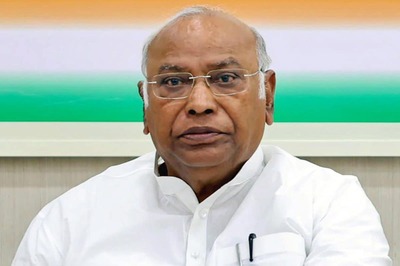
views
Tripoli: International powers meeting on Libya's future called for the first time on Wednesday for Muammar Gaddafi to step aside, but NATO countries squabbled publicly over stepping up air strikes to help topple him.
In a victory for Britain and France, which are leading the air campaign and pushed for an unequivocal call for regime change, the "contact group" of some 16 European and Middle Eastern nations, plus the United Nations, the Arab League and the African Union, said Gaddafi must go.
"Gaddafi and his regime has lost all legitimacy and he must leave power allowing the Libyan people to determine their future," a final statement obtained by Reuters said.
The wording was much tougher than at a previous conference two weeks ago. Participants also said they would work to set up a financial mechanism to help rebels, fighting to end Gaddafi's 41-year rule, run the eastern region they control.
They also called for a political settlement, to be decided by the Libyan people, and an end to attacks against civilians.
While there was agreement on the principle of removing Gaddafi, there were divisions over how to make that happen.
Disagreements surfaced on British and French calls for greater participation in the NATO air campaign against Gaddafi's heavy weapons and on arming the rebels.
British Foreign Secretary William Hague called for more alliance members to join attacks on ground targets and his French counterpart, Alain Juppe, called for heavier military pressure on Gaddafi's troops to convince him to leave power.
Reflecting frustration that NATO air power has not been more decisive, Juppe, called for better coordination with rebel forces on the ground in choosing targets.
Humanitarian disaster
United Nations Secretary-General Ban Ki-moon underlined the humanitarian disaster caused by the war, when he told the meeting up to 3.6 million people, or more than half the population, could need assistance.
There is increasing frustration in Paris and London that air strikes have neither tipped the balance of the war in favour of the rebels nor ended devastating shelling of the besieged city of Misrata, a lone rebel bastion in western Libya.
Juppe attacked NATO on Tuesday for not stopping the bombardment of the town, where hundreds of civilians are said to have died in more than six weeks of siege.
Libyan television said on Wednesday NATO planes had bombed Misrata's main Tripoli street, the scene of repeated battles between rebel defenders and government troops. It said people were killed, without giving details.
It said alliance planes also attacked Gaddafi's birthplace of Sirte, east of Misrata.
Hague told Reuters that other coalition aircraft must join ground attacks.
"There are many other nations around Europe and indeed Arab nations who are part of this coalition. There is scope for some of them to move some of their aircraft from air defence into ground-strike capability," he said.
French Defence Minister Gerard Longuet told parliament in Paris on Tuesday that without U.S. ground attack aircraft joining in the strikes, NATO would not be able to loosen Gaddafi's noose around towns like Misrata and Zintan.
Rebels call for more NATO strikes
Rebels attending the Doha meeting said they expected more support, saying NATO was using "minimum" power and needed to step up attacks on Gaddafi's heavy weapons.
Britain and France, western Europe's two main military powers, are delivering most of the air strikes on Gaddafi's armour since President Barack Obama ordered U.S. forces to take a back seat.
Other NATO countries are either keeping their distance from the campaign or enforcing a no-fly zone.
A gap appeared at the meeting between NATO hawks and doves.
Belgian Foreign Minister Steven Vanackere said the March 17 U.N. resolution authorising NATO action in Libya - to protect civilians from Gaddafi's government forces - ruled out arming civilians and he saw no need to boost air power there.
In another disagreement, German Foreign Minister Guido Westerwelle expressed reservations about an Italian call to create a fund from frozen assets to aid the rebels. "The question is, is it legal? The answer is we don't know," he said.
The rebels said they would ask for $ 1.5 billion in aid for civilians.
A spokesman for the rebel national council at the Doha talks said the coalition was considering supplying arms which he said should go to soldiers who have defected from Gaddafi's army.
He said the rebels only had "primitive weapons" taken from Gaddafi's troops.
The contact group, whose members include Qatar, Iraq, Turkey and other Middle East nations as well as NATO members, will meet again in Italy in early May.
At the eastern front on Wednesday, rebels at Ajdabiyah said they were exchanging rocket fire with Gaddafi's forces from a point about 40 km (25 miles) east of the long contested oil port of Brega, which the government holds.
Libyan government spokesman Mussa Ibrahim lashed out against the West's "imperialist way of thinking", accusing world powers of trying to impose political change on Libya.
Germany said it had expelled five Libyan diplomats for intimidating the country's citizens living there.
Rebel spokesman Shammam said the rebels wanted to increase exports of crude oil to secure humanitarian aid rather than cash. Gaddafi's forces have attacked oil fields in the rebel east to choke off exports and Shammam said the insurgents were only exporting a minimal amount.
The African Union said it was pursuing its peace mission despite rebel rejection of any plan that left Gaddafi in power. "It is urgent that the members of the international community coordinate their efforts to find a quick solution," said the AU's chief diplomat, Jean Ping.
Moussa Koussa, a former Libyan foreign minister who fled to Britain last month, was in Doha on the sidelines of the contact group talks to meet the rebels, the British government said. But the rebel spokesman said they did not plan to speak to him.




















Comments
0 comment